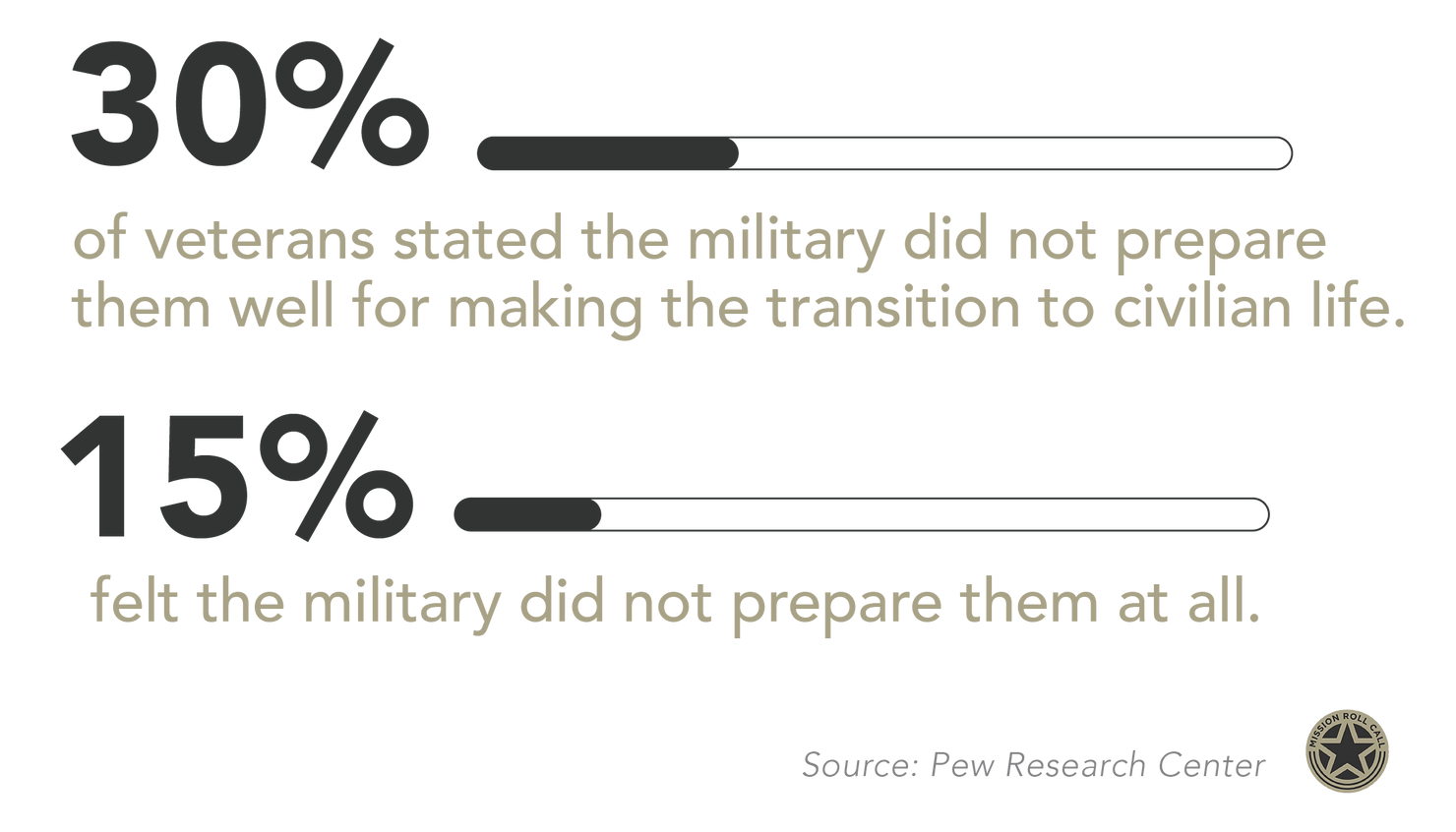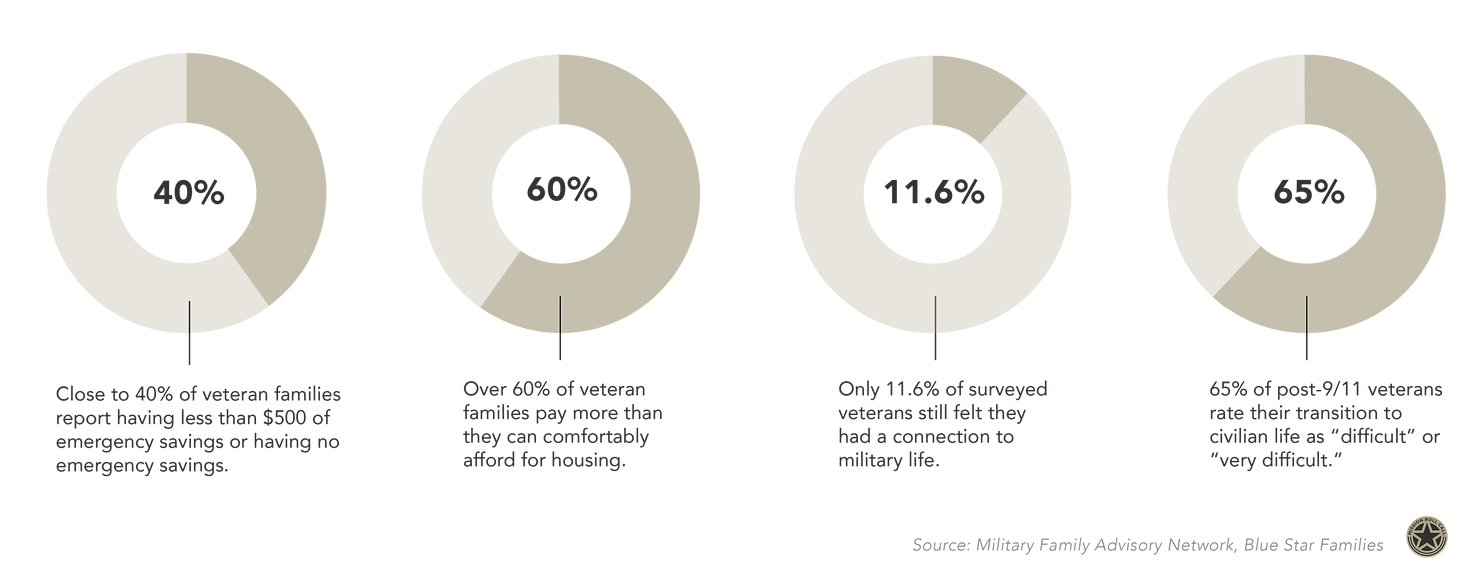Transitioning to Civilian Life: Difficulties for Veterans and Their Families

Each year, an estimated 250,000 men and women leave or retire from U.S. military service and return to civilian life. This unique transition can be difficult for veterans and their families for a number of reasons.
Shifting from service-related responsibilities to the demands of civilian life is jarring in-and-of itself, and former service members can find it challenging to relate to family, friends, and citizens who haven’t shared their experiences.
No one knows the impact of these life changes more than the people closest to former service members, particularly their families. This month, as we observe National Veterans and Military Families month, we’re compelled to share the experiences of our former service members and their families, the unique circumstances they face in military life and in readjusting to life after military service, and the contributions they continue to make to their communities.
We recently interviewed Ross Carlson, a veteran of the U.S. Army Airborne. Originally from Homer, Alaska, Carlson served in several deployments as a construction equipment repair specialist. “My transition from the Army was rough,” he shared. “I didn’t think I had resources available to me, and the ones that were available to me just seemed very far removed. It was very much an uphill struggle.” Carlson went on to note that it was ultimately his “military-can-do” attitude and his wife’s encouragement that helped him find his passion again. He now works as a firefighter EMT and has started his own vessel-based excursion business.
Carlson’s journey is just one of many. As he spoke on the various facets of his experience transitioning to civilian life, we learned how crucial it is to give service members seamless access to the resources available to them as they go through these changes. Moreover, the families of service members can benefit from support services as well, since this period can put a great deal of stress on military families.
Service members and their families face stressors during active duty life, like long periods of time apart, or needing to move frequently due to military career demands. But military life also has unique benefits, from guaranteed housing and healthcare to a strong sense of community. When service members leave the military, the shift to civilian life can introduce new stressors.
In this article, we’ll discuss the following topics:
- Is it challenging for veterans to transition to civilian life?
- What effects does transitioning from military life have on families?
- How can we support veterans and their families with transitioning to civilian life?
Is it challenging for veterans to transition to civilian life?
Veterans are a vital part of our communities. After serving our country, their discipline, tenacity, and perseverance shines through as many go into service-based roles in law enforcement, emergency management, medicine, local business, or community leadership.
But although veteran experiences are wide-ranging and not narrowly defined, it is important to highlight the difficulties many endure as they readjust to civilian life. Commonly referred to as the military-to-civilian transition (MCT), transitioning from the military can be one of the most challenging life changes for an individual and family.
There are the practical considerations, such as where to live and what job or career to pursue. While on active duty, service members receive food and housing allowances, in addition to medical care. Going from having these fundamental needs provided for to having to seek them out can be a drastic shift for military families. Navigating the healthcare system, finding a home, and applying for jobs are all things that can be overwhelming when leaving or retiring from a career that provided these necessities and created relative ease in securing them. What’s more, securing a job that assures the same kind of financial security in a new phase of life can be daunting, especially for those with a service-connected disability.
According to a 2019 report from the Pew Research Center on veteran experiences, 55% of veterans who had traumatic experiences and 66% of veterans who have experienced post-traumatic stress (PTS) said their readjustment to civilian life was at least somewhat difficult. Among those with PTS, 3 in 10 said it was very difficult. Moreover, 30% of veterans stated the military did not prepare them well for making the transition to civilian life and 15% felt the military did not prepare them at all.

Post-9/11 veterans in particular expressed more challenges in transitioning to civilian life than veterans who served prior to the Global War on Terror (GWOT). Nearly half of post-9/11 veterans said they found it somewhat (32%) or very (16%) difficult to readjust to civilian life after their service. In contrast, about 1 in 5 veterans whose service ended before 9/11 say their transition was somewhat (17%) or very (4%) difficult. In fact, 78% of pre-9/11 veterans say it was easy for them to make the transition to civilian life, the Pew study found.
Overall, post-9/11 veterans have shown strong employment levels. However, “a greater proportion of those with a service-connected disability experience transition difficulties and a lack of preparedness for themselves and their families.”
What effects does transitioning from military life have on families?
Military life can be both highly rewarding and highly challenging for families, who deserve public recognition for their own sacrifices. Having an active-duty family member often means going without seeing them for long periods and relocating multiple times due to their career demands. It is also well documented that military spouses have historically had difficulty retaining employment because of frequent moves.
But the military also provides some level of financial security, a long-term career path, a wide range of healthcare coverage, considerable retirement and pension plan options, enlistment bonuses, and ongoing professional training. Additionally, military families can take advantage of opportunities to live and serve abroad, educational benefits, better rates on home loans, and child care options. These benefits are not as readily available in the civilian world.
Upon leaving the military, families may deal with the stress of spouse un- and underemployment and out-of-pocket relocation expenses. Healthcare coverage is no longer a given for many transitioning service members and their families, and navigating the complexities of healthcare in the civilian world can be difficult.
The Military Family Advisory Network (MFAN) surveyed 8,638 military and veteran families for its 2021 report on their health, food security, finances, and housing circumstances. According to the survey, close to 40% of veteran families report having less than $500 of emergency savings or having no emergency savings. Veterans and their families also can experience feelings of disconnection and loneliness; only 11.6% of veterans still felt they had a connection to military life.

On average, civilian families pay $8,355 per child for year-round child care. This can be a considerably high expense to take on for families transitioning from military life, after having full-time, part-time, and hourly care available for their children up to 12 years of age. This benefit includes in-home and daycare services, and for school-age children, military families can take advantage of before- and after-school care as well as free or discounted summer camps. And while the military covers housing costs for active-duty families, the MFAN survey revealed over 60% of veteran families pay more than they can comfortably afford for housing.
Blue Star Families’ survey lists veteran employment, access to military/VA health care systems, veteran and family member mental health, and civilian understanding of veteran issues as the top concerns. And while 68% of employed post-9/11 veterans said they are somewhat or very satisfied with their most recent job, 80% of post-9/11 veterans report a service-connected disability and 65% rate their transition to civilian life as “difficult” or “very difficult.”
How can we support veterans and their families with transitioning to civilian life?
The challenges of transitioning from military to civilian life can be unique from typical life transitions, like entering the workforce, marriage, or retirement. When leaving or retiring from the military and entering civilian life, no two transitions are the same, and every family has distinct needs along this journey.
The Department of Veterans Affairs’ (VA) Transition Assistance Program, known as TAP, provides tools, information, and resources to service members and their loved ones to help prepare for the transition to civilian life. Service members are expected to begin utilizing TAP around one year before leaving the military, or two years before retiring, yet some have found the program fails to provide practical assistance.
TAP’s broad approach to aiding veterans in finding employment, education, and benefits is not enough. Based on veteran feedback in the Journal of Veterans Studies, more attention should be given to “key areas of their functioning such as adjusting to their new work, educational, [and] cultural settings; meeting family transition needs; financial management issues; procuring housing; dealing with trauma responses; or assuring that veterans truly obtain the benefits and support they need.”
Many in the general public feel this way too. In August, Mission Roll Call commissioned Pinkston to conduct a research survey on Americans’ attitudes regarding a range of veterans issues. Gathering responses from a nationally representative sample of nearly 2,000 U.S. adults, the survey found a significant number of Americans do not believe veterans get as much support from the government as they should. Among those who know a veteran or service member, 47% believe the federal government has not been effective in assisting veterans with transitioning to civilian life or finding affordable housing (50%), employment (41%), and healthcare (46%).
In light of this, Mission Roll Call has referred veterans to several organizations over the years that offer vital services and support, including America’s Warrior Partnership, Patriot Paws, Boulder Crest Foundation, etc. The Military Spouse Transition Program (MySTeP) also offers tips and encouragement to families preparing for the switch to civilian life.
As individuals with a spouse, family member, or friend leaving or retiring from the military, there are many ways people can offer support, such as:
- Helping veterans and their families create new routines and reconnect with extended family, friends, and loved ones.
- Pointing veterans to federal benefits and services and doctors specializing in veteran care.
- Aiding veterans in researching job placement programs, finding employment, or connecting with support groups and organizations.
- Assisting veterans with switching from military-provided benefits to options available to the general public, such as housing needs and setting up services like child care and health care.
Overall, it’s important to be patient and recognize veterans and their families have experiences that are unique from those of everyday citizens. As we commend our active-duty service members and veterans this month, let’s take time to learn more about the difficulties they face at each stage of military life. We all should be encouraged to show support to those who continue to demonstrate incredible selflessness and bravery for our benefit.